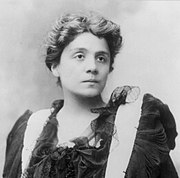Cenere (1916)
| Movie | |
|---|---|
| Original title | Cenere |
| Country of production | Italy |
| original language | Italian |
| Publishing year | 1916 |
| length | 30 minutes |
| Rod | |
| Director | Febo Mari |
| script | Eleonora Duse , Febo Mari |
| production | Arturo Ambrosio |
| camera | Eugenio Bava |
| occupation | |
| |
Cenere is a short Italian silent film melodrama from 1916 directed by Febo Mari . The legendary theater actress Eleonora Duse can be seen here in her only film role. The half-hour film is based on the 1904 novel of the same name by Grazia Deledda .
action
Rosalia Derios is an unmarried woman in a small Sardinian village. She is the lover of a married man who is giving birth to a child Rosalia names Anania. Since she cannot take proper care of her son, Anania reluctantly leaves him to her seducer. Before she leaves Anania, Rosalia gives the boy a “holy” amulet, which should always protect him on his life path. Anania grows up into a handsome young man in his father's house and one day plans to marry a girl from a wealthy family. Shortly before that, mother and son, who had been looking for Rosalia for a long time, finally meet again. But this re-encounter is not without conflicts, too many things, questions and accusations have pent up over the past few years.
Rosalia also has great problems accepting that her baby has now become a grown man. Anania sees it as his duty to take his mother with her, even if his future wife is strictly against it. And so Rosalia does not want to stand in the way of the marital happiness of her rediscovered son and kills herself for this reason in a final act of self-sacrifice. Anania stands in front of his mother's corpse and opens the amulet of yore, the Rosalia, for the first time
Once on his neck: there is only some ash in it .
Production notes
Cenere , in German ash , was filmed in Sardinia in August 1916 and premiered towards the end of the same year. There is no record of a German performance.
The content of Cenere only includes the last part of Deledda's novel. Director Mari received undisclosed help from producer Arturo Ambrosio with his production .
Mari and the actress of the fiancé Margherita were married to each other.
reception
Reclam 's film guide wrote to Cenere : “The film vision ... was - despite the participation of the Duse - not very successful. One of the reasons for the failure may have been disagreements between the director and the leading actress: Mari wanted to make a downright “star film”, while the then sixty-year-old Duse thought of a “modern” film in the style of Griffith . "
Eleonora Duse herself was more than dissatisfied with the finished product. In a letter to her French colleague Yvette Guilbert , she expressed her request not to look at “this stupid thing” because “you will find nothing or almost nothing of me in it”.
Web links
- Cenere in the Internet Movie Database (English)

